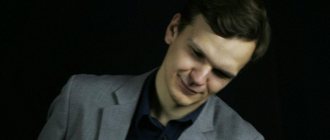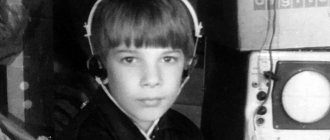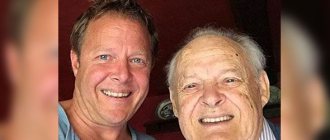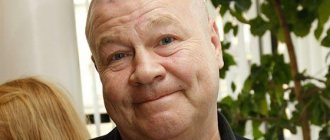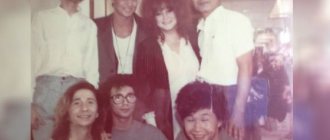Biography
Kamil Shamilevich Larin is a Russian actor, Honored Artist of the Republic of Tatarstan.
He is one of the founders of the comic theater “Quartet I”. The actor became popular thanks to his roles in the plays “Radio Day” and “Election Day”, and after the release of films of the same name, he gained all-Russian popularity. Kamil was born on November 10, 1966 in Volgograd into a Tatar family. The surname Larin appeared in the family on the initiative of the boy’s grandfather. In his youth, he changed his own last name when receiving a passport to the one that first came to mind. The boy's parents worked at a woodworking plant as engineers.
As a child, Kamil devoted a lot of time to sports, practiced various types of martial arts and weightlifting, and attended the chess section. As a teenager, he also tried his hand at poetry. Kamil explains such diverse hobbies as the influence of his parents, who had diverse interests.
After school, Larin studied at the Volgograd Power Engineering College and received the 4th category of electrical technician. But the craving for creativity and theatrical activity took over in the young man, so Kamil left for Moscow and entered the variety department of the State Theater Institute, where until 1993 the artistic director was Vladimir Korovin.
Kamil Larin: “In Kazan, as they say, there is an orthodox Tatar language”
Home / Culture
22.10.2017
The star of “Quartet I” about filming in the Tatar film about “Stubborn”, preparing echpochmak in Urgant’s “Smak” and the title of Honored Artist of the Republic of Tatarstan
One of the most recognizable Russian actors with Tatar roots came to his historical homeland to play in a Tatar comedy about the struggle between “old and new.” The BUSINESS Online correspondent visited the set and found out in a conversation with Kamil Larin how, having been born in Volgograd and living in Moscow, he can preserve his roots, why there will be a sequel about men, but a new movie about elections is not expected, and how to use the idea communism “Quartet I” has been alive and thriving for 25 years.
Kamil Larin came to his historical homeland to play in the Tatar comedy about the struggle between “old and new” / Photo courtesy of the film crew of the film “Stubbed”
“It’s STRANGE IF THE CHILDREN’S LAST NAME IS ARMENIAN OR GEORGIAN, AND THE GUYS DON’T SPEAK THEIR NATIVE LANGUAGE”
— Kamil, how did you get involved in the Tatarstan film project “Stubborn”?
— Director Rustam Rashitov called me and offered me this role. On the one hand, I received an unexpected offer, on the other hand, it was extremely pleasant, because according to the script, I was going to my historical homeland. But in fact, for the second time I came to the capital of Tatarstan to see how Tatar films were made. Frankly, I considered my participation in this project for a long time, but after some negotiations the scales tipped in your favor.
— Was the script of the film written for you?
— Probably not, but he received some processing. My role was expanded a little and made more interesting. I play a Moscow realtor, a Tatar by birth, who is forced to engage in this profession. Unfortunately, he does not know his native language. But, since the realtor’s name is Kamil, he is sent to Tatarstan to carry out a certain project, persuade an elderly local resident, the main character, the owner of the house, to move with his family, and a metro would be built on this site. It's supposed to be a comedy. There is also a lyrical line of my character. I meet a relative of Mansur, the owner of the house, Lilia, and at the same time we develop a love-carrot relationship.
— Is there something that you learn together with your hero, discover for yourself in Tatarstan?
- Certainly. First of all, I improve my language, because in Kazan, as they say, the Tatar language is orthodox. He seems to be the most correct one here. I fill my knowledge with local color, and this is what I really like about working on “Stubborn.” We come up with something along the way, change it up, there is a good creative process going on.
“I play a Moscow realtor, a Tatar by birth, who is forced to engage in this profession” / Photo courtesy of the film crew of the film “Stubbed”
— It turns out that you know the Tatar language well?
— I’m from Volgograd, I speak Tatar with my parents, and when I had grandparents, I spoke Tatar more often. I don’t have a classical school of the Tatar language, I have no literary knowledge, everything is at a conversational level...
— What language do you speak in your family?
— My wife is Russian, but with my son, whose name is Daniyar, I sometimes try to speak Tatar. It’s strange if, for example, the children’s surname is Armenian or Georgian, but the children do not speak their native language. It’s still not possible to speak Tatar with my daughter, whom my wife and I named Leysan. She is only two months old.
— We are currently having a debate in Tatarstan: is Tatar compulsory in schools or is it possible to make do with an elective? Do you have a point of view on this issue?
— I am inclined to believe that it is necessary to teach, because it develops the personality of the little man. Otherwise, national roots and traditions disappear. It is clear that Kazan is a multinational city, or at least Russian-Tatar. On the one hand, we must take into account the opinion of the Russian-speaking population, but I personally think that it would be more correct to study the language. At least to some extent. And I am pleased that many Russians here do not speak, but pretend that they certainly understand Tatar. This is normal, and it’s good that this is in the order of things in Tatarstan.
“In “Stubborn” I will appear in a completely different role - a not very confident, indecisive person who, due to circumstances, chose the profession of a realtor” / Photo courtesy of the film crew of the film “Stubbed”
“BY LOOKING AT WHAT YOU SHOW ON STAGE, I’VE CHANGED MY THINK ABOUT GETTING MARRIED”
— You are a Tatar from Volgograd, you live in Moscow, do you manage to preserve Tatar family traditions?
- You're right, it's not easy. I have a Russian-Tatar family. When children were born, I ordered a ram, as expected, two for my son, one for my daughter. The children's names are also Tatar. That's probably all. One day I had to take part in Vanya Urgant’s “Smak” program, I had to figure out something to cook. I decided to start with national cuisine, called my mother, she gave me a recipe for echpochmak. First we rehearsed, prepared it at home with my wife, and it turned out well. Then I tried to cook it under the cameras, and everything also turned out well.
— Starting with the play “Radio Day”, and then thanks to the film “Election Day”, you vividly entered into the image of the ever-subtle Tatar sound engineer. Did this image bother you in the future? And why is he so remembered by the public?
- No, I didn’t interfere, this is basically my profession - to transform. In every work I try to put the role through myself and do something new, even if you constantly play this character in the play. Otherwise, who will be interested if the same character is on stage. Even in “Stubborn” I will appear in a completely different role - a not very confident, indecisive person who, due to circumstances, chose the profession of a realtor. In each of my characters I try to find features and details that are organic to me. I hope that the image that was conceived in “Stubborn” will be read by the audience in this film.
— Many fans of “Quartet I” are waiting for February 22 next year, when the third part of the film “What Men Talk About” will be released. Why did the genre of conversation you chose turn out to be so successful and was accepted by the public both in film presentation and in performances? Take the same play “Conversations of middle-aged men about women, cinema and aluminum forks,” which has been successfully running on stage for almost 10 years.
— “What Men Talk About” is called “Continuation.” This will be another story about the travels of four friends, this time we are going to St. Petersburg, my character invites his friends, but where exactly, I can’t say yet, you will find out from the film. Everyone, as always, has a lot to do, but my hero insists that everyone go. Again adventures and conversations, conversations, conversations. About women, about relationships with parents, about the need to be happy. Last Saturday in Moscow we showed a draft version to friends, and it seemed to have some minor errors, but everyone liked it. So we will bring the film to the final version. Of course, compared to the first film, the characters have become more mature, there are conversations about medicines, the fact that I, for example, recognize my age by knowing the names of medicines...
Of course, with this we are afraid of scaring off the younger audience of our fans, but we are growing up along with our characters. It would be strange to talk about some youthful and teenage topics, we are talking about ourselves, what we know, what we experience, what is. The success of these films and theater plays is that it is true. In general, you need to talk about what you know. If you are making things up, they may not believe you. And we know the topics we discuss very well. We are worried, and as it turns out, it’s not just us, there are a huge number of people with us. After the first film was released, many people told us that this was some kind of film therapy. We thought that these problems were only in our family, but they are everywhere. One young man, after the play “Conversations of Men...”, which we played in St. Petersburg, came up to the service entrance and said: “Thank you very much, looking at what you show on stage, I changed my mind about getting married.” This is also a good result. Maybe the man did not make some fatal mistake in his life.
- Evgeny Grishkovets once accused your quartet, saying that with your “talks” you are taking away his bread, you are grazing in one “human clearing”. Did you manage to make peace with him?
- Yes, we didn’t quarrel. He may have made a mistake, he may have expressed himself emotionally, this is his personal matter. He even invited me to my birthday. We are not enemies, but we are not friends either. There was no conflict as such on our part.
“IN OUR TEAM WE HAVE A COMMUNIST PAYMENT SYSTEM, WE DIVIDE ALL THE MONEY EARNED EQUALLY”
— Next year “Quartet I” will celebrate its 25th anniversary. How do you manage to work together as one team for so long? After all, everyone has vanity...
— The guys and I also studied together, so add 5 years to this piggy bank. And Leonid Barats and Rostislav Khait, those from Odessa, were friends before this, and their creative union is generally 40 years old... At some point we realized that it would be easier and simpler to exist as a team in our profession. It is much more difficult to break through alone. And when the team is not only like-minded people, but also friends, then somehow everything settles down. It is clear that, like in any family, we had some disagreements and jealousy, but now we realized that we are much better together. Make friends, work, earn money, and this is probably the main component in the history of our quartet. A creative person must be vain, otherwise he will not succeed. You can, for example, consider these Kazan shoots of mine as a personal project. This is about family. That is, now I am “walking on the side.” But since our team has a communist payment system, we divide all the money we earn equally, so it turns out that I work for five people. In addition to the four cast members, we also have a director. That is, what I earn in Kazan, we will divide among everyone. And so does each of our team.
As for vanity, I have published two books of poems. We made the first one in tandem with our friends who write poetry. These are musicians, artists, and directors. There you can find poems by Lesha Kortnev, Nonna Grishaeva, Alena Babenko, and the Krestovsky brothers. And my wife Ekaterina and I published our second book last year, when we celebrated our fiftieth anniversary. This is already my personal collection. I would like to sing a little more, maybe with Lesha Kortnev from “Accident” in tandem, maybe without him, but there are certain ideas in this direction. But I can’t do anything with enterprises; I almost always refuse. Still, first of all, this is a family - a quartet. And since we suddenly have touring performances or participation in other projects, I cannot participate in enterprises.
“My mother told me as a child: “What a beautiful language we have, I don’t understand a damn thing, but how beautiful it is.” Photo: © Mikhail Fomichev, RIA Novosti
— The events with the arrest of Kirill Serebryanikov stirred up a discussion in society about the relationship between cultural workers and the state. How do you resolve this issue?
— We do not have any government support. Personally, I try not to go into politics, and we do not have political statements, pamphlets addressed to the country, the president, or the government. We try not to touch on these topics, because we are not a political theater, not a platform for slogans. We are talking about people who live in our country. At least I don’t go to demonstrations or barricades.
— Were there any offers to take part in real political life?
- Yes. After the release of the film “Election Day 2,” they called me and offered to run as a candidate for mayor; I won’t say in which area. I was discouraged. Cinema is one thing, life is another thing. As you understand, when nominating me now, people will associate me with the image they saw in the film. This is what the election campaign was built on. But it will be a farce! Everyone will hate me, they will say that I am a scoundrel, that I pulled away some of the votes and went into oblivion. In politics you need to act very carefully.
— Nevertheless, today many artists and singers can be seen in the same State Duma...
- I don’t know, this is a conversation with your conscience. It’s one thing when you yourself speak out on some issue, it’s another thing when you are asked to say something. You are already flirting with the authorities. We, thank God, did not have any offers to join somewhere, or to become a trusted representative.
- Well, okay, but did the authorities try to censor you?
“Once these pictures came out, there was definitely no censorship.” Another thing is that films often became prophetic to some extent. The first “Election Day” appeared on the screen back in the days when governors were elected, not appointed. And then, when the elections were cancelled, we were almost accused that the painting was commissioned... And there were many such moments.
“OF OF COURSE THEY DIDN’T GIVE AN APARTMENT, BUT THAT’S NOT WHAT I’M FOR”
— Should viewers wait for the third part of “Election Day” or is the political situation in the country such that there is no time for jokes?
— So far we haven’t thought about this topic at all. The second part happened by chance on the wave of the success of the first. The main thing here is not to get on the conveyor belt. The film “What Men Talk About” simply became very relevant, because we realized that there is some kind of understatement, there are topics that can be talked about and talked about. As I have already stated, we only do things that we know for sure. So perhaps our film about cinema will appear soon. But this does not mean that we will film our recent play “There’s Something Missing in Borenka” about a director who is missing something... But we’ll most likely come up with something around this theme. Because we more or less know her. There is nothing to say about the elections yet.
In fact, over the 25 years of our existence, we have not had many plays and films. And all because we have been nurturing the idea of a production or film for a long time. As for us, they are not born right away. We are not Woody Allen, we cannot release one film a year, we alternate them with performances. “There’s something missing in Borenka,” for example, took four years to write. Something is constantly being removed, something is being compiled. Then, some performances, like “Election Day,” are removed from the repertoire, which means that a new production needs to be staged in this place. Because the theater must live, and the relevance of the performance is revealed simply by whether the viewer comes or not. By the way, we have been playing “Radio Day” for the 18th year now, and it does not become outdated. This is our business card.
“Tatarstan decided to recognize me, and this, of course, is nice. Just that moment of vanity” Photo: tatmsk.tatarstan.ru
— At the beginning of the interview, you said that it was your second time in Kazan. But you are already an Honored Artist of the Republic of Tatarstan. How did this happen?
— I performed several times at the Tatarstan embassy in Moscow, and there was another concert where Rustam Minnikhanov was present, already being president. Well, apparently, I liked how I joked something about the Tatar language. As my mother told me as a child: “What a beautiful language we have, I don’t understand a damn thing, but it’s so beautiful.” And a week later they called me and told me to collect documents for the title. I also teased the guys from the quartet with this; for two years they announced my appearance on stage at parties, weddings or birthdays as “the Honored Artist of the Republic of Tatarstan will now read a congratulatory ode.” And it turned out that they thought materially.
At first I felt some discomfort. It seems like we all play together, but only I have the title. But on the other hand, Tatarstan decided to celebrate me, and this, of course, is pleasant. Just that moment of vanity. Of course, they didn’t give me an apartment, but that’s not what I was there for. We in the quartet live by the principle: don’t ask for anything, if they want it, they’ll come and give it. This is an expression from Bulgakov’s “The Master and Margarita”. The title, in fact, may not give anything. A person may be deserved or over-deserved, but no one knows him. But in our country, films are often shown on TV, on airplanes, and spectators come to the theater. This is really valuable to us.
Oleg Platonov
Kamil Shamilevich Larin (Tat. Kamil Shamil uly Larin; born November 10, 1966, Volgograd, RSFSR, USSR) is a Russian theater and film actor, Honored Artist of the Republic of Tatarstan. One of the founders of the comic theater "Quartet I". He became famous for his role as electrician Kamil in the plays “Radio Day” and “Election Day” and in the films of the same name: “Election Day” (2007) and “Radio Day” (2008).
Born on November 10, 1966 in Volgograd. Tatar by nationality. Graduated from the Volgograd Energy College.
In 1993 he graduated from the variety department of GITIS (artistic director of the course is Vladimir Sergeevich Korovin). During his studies, he met Alexander Demidov, Leonid Barats, Rostislav Khait and director Sergei Petreikov. As a result, Quartet I was formed.
He was the TV presenter of the program “I Believe - I Don’t Believe” on the TNT channel as part of Quartet I.
Larin came to Kazan to film the Tatar full-length feature film “Kire” (“Stubborn”). Fanis Ziganshin also stars in the title role . The directors of the film, Ilseyar Damaskin and Rustam Rashitov, intend to tell a story about the conflict between old and new, which is also woven into the relationship between generations.
Ex-wife - Galina Larina, son - Yan Larin (born 02/25/1993).
On September 19, 2014, he married employee Ekaterina Andreeva, who on February 17, 2020 gave birth to his son Daniyar.
On August 8, 2020 at 9:19 a.m. a daughter was born into the family of Kamil and Ekaterina. The girl was named Leysan.
Filmography:
2004 - “My Fair Nanny” - Leonid, butler (episode 95)
2006 - “Who’s the boss?” — Marat
2007 - “Election Day” - Kamil Renatovich, technician of the hardware and studio complex
2008 - “Radio Day” - Kamil, technician of the hardware and studio complex
2008 - “Volt” - pigeons Vinnie, Bobby, Joey, Louis, Blake, Tom, Billy, etc. (Russian dubbing)
2009 - “Phoenix Syndrome” - Anatoly Abdrykov, Tatyana’s ex-husband
2010 - “What men talk about” - Kamil
2010 - “Doctor Tyrsa” - jeep driver (episodic role)
2010 — “Troubadour” (short film)
2011 - “What else do men talk about” - Kamil
2011 - “Newlyweds” - Anton, Lesha’s colleague
2012 - “Santa Claus always calls three times” - neighbor from apartment 110
2012 - “Strong Marriage” - Alexey Mukhin, Marina’s husband
2013 - “Faster than rabbits” - traffic police inspector
2013 - “Packed” - Sergei Kamaev, Margarita’s husband
2014 - “Aunties” - plumber
2016 - “Wonderland” - artist Sergei Alexandrovich Dubrovsky
2016 - “Election Day 2” - Kamil
print version
Theater Quartet I
At the university, Kamil Larin met aspiring actors - Alexander Demidov, Leonid Barats, Rostislav Khait, as well as director Sergei Petreikov, with whom he organized the highly specialized comedy theater “Quartet I”. Kamil has been serving in this theater since its foundation and does not intend to stop this cooperation. In “Quartet I” Kamil was involved in the sensational author’s plays “Radio Day”, “Election Day”, “Conversations of middle-aged men about women, cinema and aluminum forks” and many others.
Since 2005, together with other members of Quartet I, Larin has been a co-host of the entertainment program “I Believe - I Don’t Believe” on the TNT channel. The program was structured as a news release consisting of 8 stories, some of them true, and some of them humorous. During the program, viewers could send their own versions of which news, in their opinion, was real and which was false, thus participating in a kind of competition.
Filmography of the artist
On the crest of success, the guys from the quartet began making films with heroes who were distinguished by charisma, sincerity and a wonderful sense of humor. Thus, the films “Election Day” (2 parts), “What Men Talk About” (3 parts), “Faster than Rabbits” began to be released with Alexander Demidov, Leonid Barats, Rostislav Khait and Kamil Larin. Kamil has one of the main roles. Most viewers fell in love with his hero, who knows life, has a sharp tongue and a loving attitude towards life.
Pictures of the “Quartet” receive high praise from critics and television viewers, they are awarded with various prizes and film awards. The most interesting and memorable are the paintings “What Men Talk About” and “What Else Men Talk About.”
View gallery
In addition to film adaptations of the theatrical performances of “Quartet I,” Larin also starred in such television series as “Who’s the Boss,” “My Fair Nanny,” and “The Wick.” There were also roles in full-length films: “Wonderland”, “Newlyweds”, “All So Sudden”. In addition, Kamil was involved in dubbing foreign cartoons. Together with the guys from the quarter, he starred in video clips of young and talented performers.
Movies
Camille Larin made his feature film debut in 1993 in an episode of the film “Your Fingers Smell of Incense.” The next time Kamil appeared on the big screen was 9 years later in three films at once - the comedy by Ivan Dykhovichny “Money”, the youth film “Special Report, or the Superman of this Day” and the comedy “Radio Day”.
In 2004, he starred in one episode of the popular humorous sitcom “My Fair Nanny,” playing the new butler Leonid, who came to work at the house of producer Shatalin. Later, the actor appeared in other television comedies, for example, “Who's the Boss?”, “Phoenix Syndrome” and “We Got Married.”
But the actor gained real popularity among the audience after the film adaptation of the performances of the Quartet I troupe. In 2007, Larin starred in the role of a hardware-studio complex technician, whose name is Kamil Renatovich, in the farce comedy “Election Day.” By the way, in the play the character’s middle name coincides with the middle name of Kamil Shamilyevich, but in the films it was decided to change it in order to emphasize that the actors are not playing themselves at all. Although each member of the cast got an image that was incredibly close in spirit and life experience. The film was a huge success and was named the best comedy of the year. Fans began to become interested in the actor’s creative biography.
Following the success, other performances were filmed. In the film "Radio Day" Camille Larin plays the same character. In the film “What Men Talk About,” filmed in the style of a road movie and also containing traces of outright farce, the actor plays one of the friends traveling from Moscow to Odessa by car for the sake of wanting to go to the concert of his favorite band “Bi-2”, and ends up in unexpected road stories. The new film repeated the success of the previous ones, and the Quartet I team for the first time decided to write an original script specifically for the film, which resulted in a continuation of this film called “What Else Men Talk About.” The film became the highest-grossing film of the year, grossing $17 million.
In addition to feature films, Larin participated in the filming of music videos several times. In the late 90s, Kamil appeared in Murat Nasyrov’s video “The Boy Wants to Go to Tambov,” where he played the hero Fester Addams. Later, the artist starred in the video “Cheerful World” by the rock group “Agatha Christie”, in “It’s Dawn Outside the Window” by the rock and rollers “Bravo”, in the popular chanson style song “Young” performed by Efrem Amiramov, as well as in Sasha Ch’s video “Only you won’t come today”, where, in addition to him, other members of the Quartet I theater also participate.
In 2013, Kamil Larin participated in the entertaining musical show “Repeat!” on Channel One, where he performed parodies of the stars of Russian show business, television and cinema - Muslim Magomayev, Efim Shifrin, Nikolai Drozdov, Tatyana Doronina, Igor Kornelyuk, Nikita Mikhalkova.
Filming in video clips
Not many people know, but in Murat Nasyrov’s video “The Boy Wants to Go to Tambov,” Kamil starred in the role of Fester Addams.
The role of an officer rebelling against the authorities in the video clip of the musical group “Agatha Christie” called “Merry World” went to Kamil Larin. Unlike the guys from Kvarter I, who also starred in the video, Kamil had a role with words.
In the Bravo group’s video “It’s Dawn Outside the Window,” the artist and the quartet played the role of entertainer. After this, Larin could be seen in Efrem Amiramov’s video clip “Young” (in the role of a gambler). His stage buddy Rostislav Khait also appeared with him, playing a drunkard. The guys’ next shooting took place in the video of the young singer Sasha Ch “Only you won’t come today.” In Clementia’s video entitled “Somewhere Beyond the Seas,” representatives of Quartet I played dancing medical workers.
View gallery
Personal life
In 1989, Camille Larin married for the first time. The actor met his wife Galina in a train compartment heading to Volgograd. In 1993, their son Ian was born, who, like his father in childhood, became interested in sports and became a candidate for master of sports in archery. The boy also graduated from a theater and music school. The marriage of Kamil and Galina broke up in 2012, but the former spouses maintained friendly relations and communicate regularly.
In September 2014, changes occurred in Kamil's personal life. Larin remarried. The new chosen one was Ekaterina Andreeva, who holds the position of head of the department. The newlyweds met a year before the wedding at the Chereshnevy Les festival, the organizer and leader of which was Ekaterina.
In January 2014, Kamil took part in the Winter Olympics relay, during which the Olympic flame traveled for 123 days in Sochi. Larin was one of the torchbearers in his native Volgograd.
On the Instagram network, Kamil Larin maintains his own microblog, where he posts photos with his wife, as well as pictures with friends - members of the Quartet I theater.
Personal life of Kamil Larin
For the first time, the artist tied the knot at the age of 23. His wife was a young girl whom he met right in the train compartment upon returning to his hometown. Galina, that was the name of Kamil Shamilyevich Larin’s chosen one, impressed the actor so much that he, in his own words, spent the trip trying to win over the fairer sex he liked.
The couple lived in marriage for about 20 years. The woman gave the “Election Day” star a son, who was named Ian. The couple's relationship was more like a friendship. After the separation, the ex-spouses were able to maintain respect and decent attitude towards each other.
View gallery
After 2 years, the artist married for the second time. Kamil Larina's wife is a young girl named Ekaterina Andreeva. It is known that before meeting the actor, she worked at. The artist’s wife gave birth to two children - a son, Daniyar, in 2020, and a daughter named Leysan in 2017. Despite the large age difference, according to Kamil, he and his young wife lead a happy, harmonious life.
Camille Larin now
In March 2020, a talk show with Kamil Larin “Alone with Everyone” aired on Channel One, where the artist talked about children, parents, friends, and shared his latest jokes. In the same year, Kamil Larin’s filmography was replenished with the farce comedy “Election Day 2,” the first part of which brought the artist his first film success 9 years ago.
On August 8, 2020, Camille Larin became a father for the third time. His wife Ekaterina gave the artist a daughter, who was born in a Moscow clinic. The newborn baby became the couple’s second child together – in 2014, their first-born Daniyar was born.
Now the actor is busy in the project “What Men Talk About. Continuation”, which is scheduled to premiere in 2020. Among the members of the film's acting ensemble are Tatyana Dogileva, Leonid Kanevsky and businessman Mikhail Prokhorov.
